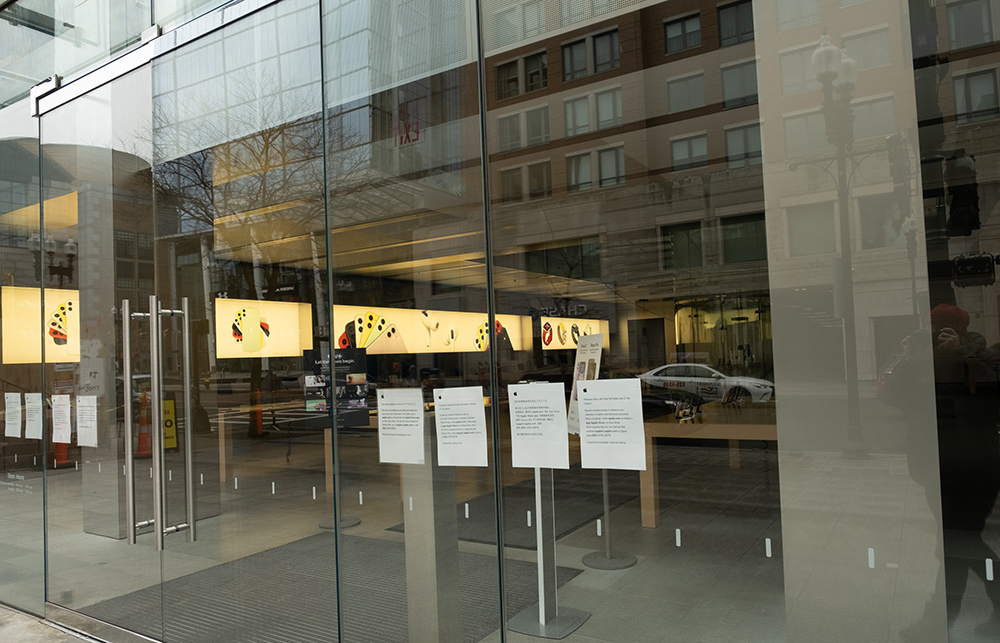
新冠疫情肆虐,全球無線運(yùn)營商不斷關(guān)閉店面。市場(chǎng)調(diào)研機(jī)構(gòu)Gartner發(fā)布的報(bào)告顯示,今年一季度智能手機(jī)銷量驟減,同比降幅達(dá)20%,也是有記錄以來跌幅最嚴(yán)重的一次。
Gartner高級(jí)研究分析師安舒爾?古普塔表示,“新冠疫情導(dǎo)致全球智能手機(jī)市場(chǎng)出現(xiàn)了有史以來最嚴(yán)重的下滑。大多數(shù)中國廠商和蘋果公司都受到重創(chuàng),因?yàn)樵O(shè)在中國的工廠暫時(shí)關(guān)閉,疫情中消費(fèi)者的支出也在減少。”
該報(bào)告跟其他調(diào)研得到的數(shù)據(jù)一樣,都顯示疫情期間手機(jī)銷量大幅下滑。 國際數(shù)據(jù)公司(IDC)表示,一季度從制造商到零售商的手機(jī)出貨量下降了12%,蘋果公司報(bào)告稱,上季度 iPhone 銷售收入下降了7%。不過疫情期間筆記本電腦等硬件銷售業(yè)績亮眼,因?yàn)樵絹碓蕉嗟娜艘徶迷O(shè)備居家辦公。
Gartner調(diào)研數(shù)據(jù)還顯示,在三大智能手機(jī)銷售商中,三星出貨5500萬部,同比下降23%; 華為出貨4200萬部,同比下降27%; 蘋果出貨4100萬部,同比下降8%。智能手機(jī)全行業(yè)出貨2.99億部,同比下降20%。
中國手機(jī)制造商華為手機(jī)銷量下降幅度最大,因?yàn)槌咔橹猓A為還受到美國軟、硬件供貨商,尤其是谷歌“斷供”造成的沖擊。
古普塔點(diǎn)評(píng)說,“華為這一年將充滿挑戰(zhàn)。華為開發(fā)了移動(dòng)服務(wù)(HMS)生態(tài)系統(tǒng),但無法下載流行的谷歌應(yīng)用也無法連接谷歌應(yīng)用商店,就不太可能在國際市場(chǎng)上吸引智能手機(jī)新用戶。”
三星的銷量下滑也很明顯,2月新款 Galaxy S20系列手機(jī)剛亮相,3月份就開始打折促銷了。(財(cái)富中文網(wǎng))
譯者:梁宇
審校:夏林
新冠疫情肆虐,全球無線運(yùn)營商不斷關(guān)閉店面。市場(chǎng)調(diào)研機(jī)構(gòu)Gartner發(fā)布的報(bào)告顯示,今年一季度智能手機(jī)銷量驟減,同比降幅達(dá)20%,也是有記錄以來跌幅最嚴(yán)重的一次。
Gartner高級(jí)研究分析師安舒爾?古普塔表示,“新冠疫情導(dǎo)致全球智能手機(jī)市場(chǎng)出現(xiàn)了有史以來最嚴(yán)重的下滑。大多數(shù)中國廠商和蘋果公司都受到重創(chuàng),因?yàn)樵O(shè)在中國的工廠暫時(shí)關(guān)閉,疫情中消費(fèi)者的支出也在減少。”
該報(bào)告跟其他調(diào)研得到的數(shù)據(jù)一樣,都顯示疫情期間手機(jī)銷量大幅下滑。 國際數(shù)據(jù)公司(IDC)表示,一季度從制造商到零售商的手機(jī)出貨量下降了12%,蘋果公司報(bào)告稱,上季度 iPhone 銷售收入下降了7%。不過疫情期間筆記本電腦等硬件銷售業(yè)績亮眼,因?yàn)樵絹碓蕉嗟娜艘徶迷O(shè)備居家辦公。
Gartner調(diào)研數(shù)據(jù)還顯示,在三大智能手機(jī)銷售商中,三星出貨5500萬部,同比下降23%; 華為出貨4200萬部,同比下降27%; 蘋果出貨4100萬部,同比下降8%。智能手機(jī)全行業(yè)出貨2.99億部,同比下降20%。
中國手機(jī)制造商華為手機(jī)銷量下降幅度最大,因?yàn)槌咔橹猓A為還受到美國軟、硬件供貨商,尤其是谷歌“斷供”造成的沖擊。
古普塔點(diǎn)評(píng)說,“華為這一年將充滿挑戰(zhàn)。華為開發(fā)了移動(dòng)服務(wù)(HMS)生態(tài)系統(tǒng),但無法下載流行的谷歌應(yīng)用也無法連接谷歌應(yīng)用商店,就不太可能在國際市場(chǎng)上吸引智能手機(jī)新用戶。”
三星的銷量下滑也很明顯,2月新款 Galaxy S20系列手機(jī)剛亮相,3月份就開始打折促銷了。(財(cái)富中文網(wǎng))
譯者:梁宇
審校:夏林
Smartphone sales plunged 20% in the first quarter from a year earlier, the sharpest decline on record, according to market tracker Gartner, as the global pandemic forced wireless carriers to shutter stores worldwide.
“The coronavirus pandemic caused the global smartphone market to experience its worst decline ever,” Anshul Gupta, senior research analyst at Gartner, said in a statement. “Most of the leading Chinese manufacturers and Apple were severely impacted by the temporary closures of their factories in China and reduced consumer spending due to the global shelter-in-place.”
The report is consistent with data from other sources, all of which showed a huge drop in phone sales during the COVID-19 outbreak. IDC said first-quarter phone shipments from manufacturers to retailers dropped 12%, and Apple reported its revenue from iPhone sales fell 7% last quarter. Some other hardware categories, like laptops, have held up better during the pandemic as more people needed to buy gear to work from home.
Among the three largest smartphone sellers, Samsung saw the number of phones it sold shrink 23% to 55 million, Huawei’s sales fell 27% to 42 million, and Apple’s sales dropped 8% to 41 million, according to Gartner. Industrywide, phone sales dropped 20% to 299 million devices.
Chinese phonemaker Huawei, which suffered the largest drop, is also being hurt by U.S. efforts to cut off its access to American hardware and software suppliers, particularly Google.
“Huawei will have a challenging year,” Gupta says. “It has developed the Huawei Mobile Service ecosystem, but with the lack of popular Google apps and Google Play store, Huawei is unlikely to attract new smartphone buyers in international markets.”
Samsung’s decline was also significant as its new line of Galaxy S20 phones debuted in February and went on sale in March.






